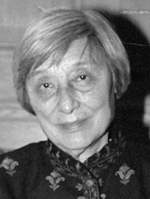Writer Han Suyin dies at 95 in Lausanne
Updated: 2012-11-05 00:35
By Mei Jia (China Daily)
|
|||||||||||
Chinese-British writer and physician Elizabeth Comber, whose pen name was Han Suyin, died at the age of 95 on Friday at her home in Lausanne, Switzerland.
A memorial service will be held in Lausanne on Thursday, her family told Xinhua.
The biographer of Mao Zedong and premier Zhou Enlai, Comber, a writer of both fiction and nonfiction works, is the author through whom most English- and French-speaking readers got their earliest images and understanding of China.
Chinese-American writer Frank Chin credits her with being one of the few who "(wrote) knowledgeably and authentically of Chinese fairy tales, heroic tradition and history" in his essay Come All Ye Asian American Writers of the Real and the Fake.
Her semi-autobiographic novel A Many Splendored Thing was made into a Hollywood hit in the 1950s, winning three Oscars.
Shuttling between China and the Western world, Comber had a colorful life, which was also deeply rooted in her unstoppable pursuit of telling real Chinese stories to her world audience.
She was named "Friendship Envoy" by the Chinese People's Association for Friendship with Foreign Countries.
 |
|
Han Suyin, writer |
"She visited China regularly and kept a keen eye on the beloved country, even from far away. Her pen name 'Han', homophonic to the Han people, is an evident manifestation," Jin Jianfan, writer and a former friend, told Chinese media.
Jin, on behalf of the Chinese Writers Association, had worked with Comber to set up the National Rainbow Award for Best Literary Translation, now Best Translation Award under the prestigious Lu Xun Literary Award.
Comber was born Rosalie Elisabeth Kuanghu Chow in Henan province in 1917, to a Chinese father who was a railway engineer and a Belgian mother from an aristocratic family.
The father Chow Yen Tung, born in Chengdu, Sichuan province, was among the first government-funded students to study outside China. The father gave mooncakes to his Eurasian daughter, whose birthday happened to fall on the Mid-Autumn Day. It's said that the grown-up Comber missed mooncakes a great deal when she was abroad.
Young Comber dreamed of being a doctor and she pursued the dream by studying medicine in Yenching University and later in Brussels and London.
In Brussels she developed a strong literary interest and eagerly read the masterpieces. Looking back on days in Chengdu, where she worked as a midwife, she got the inspiration for her debut novel Destination Chungking (Chongqing). With help from a US colleague, the book was published in the United Kingdom and the United States, which boosted her writer's career.
"In my memory, my mother was always busy working in hospitals during the daytime, and busy writing and translating in her spare time at home," her daughter Tang Yungmei told the Guangzhou Daily.
Tang, who was educated in the US, had returned to Chengdu to be a teacher, to fulfill Comber's wish.
"I first returned to the city in 1972, but I felt familiar with it. My mother loves it hugely and hoped I could return one day," Tang said.
Comber lived in different countries with her second husband Leon F. Comber, a British officer and later publisher, and with her third husband Vincent Ratnaswamy, an Indian colonel. Her fiction and nonfiction, written in both English and French, recreated her own experiences and the China she saw during her stays. Eventually, she settled down in Lausanne.
As a British citizen, she was among the first foreign nationals to visit China after 1949. Her photos appeared on the news with leaders who she came to know well. She also funded or helped establish several Chinese literary awards to encourage young writers and translators.
Writer Jian Ping, who won the Bingxin Award for Children's Literature, which Comber helped to establish in 1990, said, "Han Suyin was the most impressive foreigner of my childhood days."
Comber's relatives in Chengdu have been thinking about her and reminiscing since they heard of her death, they told local media.
Her legacy will continue with the Han Suyin Award for Young Translators, which has been the most renowned prize for young translators in the country since 1989. It has inspired cross-cultural dialogue and communication, just as she did.
Contact the writer at meijia@chinadaily.com.cn
Today's Top News
President Xi confident in recovery from quake
H7N9 update: 104 cases, 21 deaths
Telecom workers restore links
Coal mine blast kills 18 in Jilin
Intl scholarship puts China on the map
More bird flu patients discharged
Gold loses sheen, but still a safe bet
US 'turns blind eye to human rights'
Hot Topics
Lunar probe , China growth forecasts, Emission rules get tougher, China seen through 'colored lens', International board,
Editor's Picks

|

|

|

|

|

|





